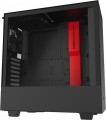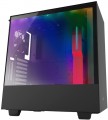3.5" bays
The number of internal 3.5" form factor bays provided in the design of the case. Such bays, in accordance with the name, are intended for internal components, mainly hard drives and some SSD modules; to access them, the case must be disassembled.
Theoretically, the number of bays corresponds to the maximum number of drives that can be installed in the chassis. However, in fact, the best option is to install drives through a single slot to ensure efficient cooling. Accordingly, it is best to select a case in such a way that the number of internal 3.5" bays is twice the expected number of hard drives.
internal 2.5" compartments
The number
of internal 2.5" bays provided in the case design.
Such bays are mainly used for installing internal hard drives and SSD modules; The 2.5" form factor was originally created as "laptop" form factor, but recently it has been increasingly used in components for full-size PCs. At the same time, when evaluating the number of these bays, note that drives are recommended to be installed through a slot; so in Ideally, the number of bays should be twice the planned number of drives.
Also note that some cases use combined bays: initially they have a size of 3.5", but if desired, they can be converted to 2.5". These bays count towards both 3.5-inch and 2.5-inch slots. In fact, this means that the total number of available slots is not always equal to the sum of the number of both. For example, a case with 10 3.5" bays and 6 2.5" bays can have 4 combined bays, and the total number of slots in this case will not be 16, but only 12.
Graphics card vertical mount
The ability to install a graphics card in the case vertically, facing the side panel. To do this, the design provides for an appropriate bracket, and the graphics card is connected to the motherboard with a special extension cable — a riser. This feature is found in open cases and models with a viewing window (see relevant paragraphs), its purpose is primarily aesthetic: a vertically placed graphics card is clearly visible from the outside, which gives the case an original appearance, designed for fans of external modding. But
vertical installation does not provide any fundamental practical advantages.
USB 3.2 gen1
The number of native USB 3.2 gen1 connectors (previously labeled as USB 3.1 gen1 and
USB 3.0) provided in the case.
Such connectors are usually located on the front side (for more details, see "Location"). They are most convenient for peripherals that need to be connected and disconnected often — for example, "flash drives" (for permanently connected devices, it is more convenient to use the motherboard connectors displayed on the rear panel). Specifically, the USB 3.2 gen1 standard has replaced the USB 2.0 described above, it provides 10 times the data transfer rate (up to 4.8 Gbps) and higher power supply, while USB 2.0 peripherals can also be connected to such connectors .
It is worth remembering that for normal operation of ports, their number and version must correspond to the capabilities of the motherboard.
USB type C 3.2 gen2
Number of native
USB-C 3.2 gen2(previously USB-C 3.1 gen2 and USB-C 3.1) connectors provided in the chassis.
Such connectors are usually located on the front side (for more details, see "Location"). They are most convenient for peripherals that need to be connected and disconnected often — for example, "flash drives" (for permanently connected devices, it is more convenient to use motherboard connectors that are displayed on the rear panel) . Specifically,
USB-C is a relatively new type of USB connector — smaller than classic USB and double-sided design. The use of such a connector may be different, depending on the features of the motherboard: in particular, it can also be used as a Thunderbolt v3 port, and the 3.2 gen2 connection interface is characterized by a bandwidth of up to 10 Gbps.

